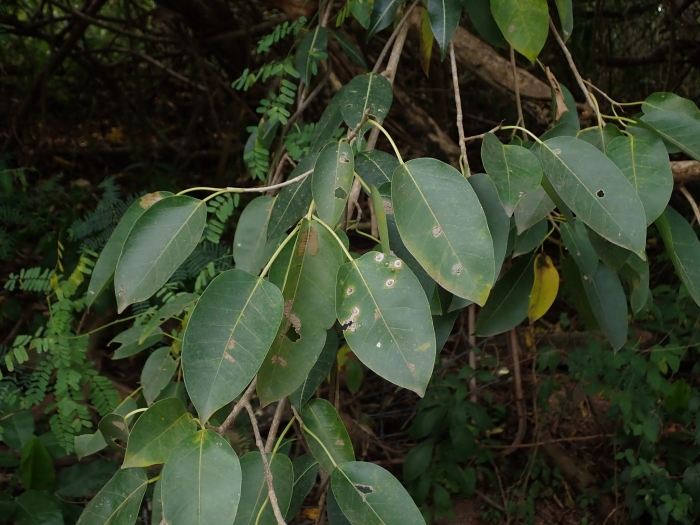Shortleaf Fig
(Ficus citrifolia)
Shortleaf Fig (Ficus citrifolia)
/
/

© Daniel Cahen
CC BY 4.0
Image By:
© Daniel Cahen
Recorded By:
Copyright:
CC BY 4.0
Copyright Notice:
Photo by: © Daniel Cahen | License Type: CC BY 4.0 | License URL: http://creativecommons.org/licenses/by/4.0/ | Uploader: danielcahen | Publisher: iNaturalist |

























Estimated Native Range
Summary
Ficus citrifolia, commonly known as Shortleaf Fig or Wild Banyan Tree, is a semi-evergreen tree native to coastal hammocks, tropical dry forests, and limestone outcrops in southern Florida, the Caribbean, Mexico, Central America, and northern South America. It can grow up to 49 feet (15 meters) tall with a broad, spreading canopy supported by aerial roots that develop into thick, woody trunks. The leaves are dark green and glossy, and the tree produces small, inedible figs that attract a variety of wildlife. The Shortleaf Fig is a keystone species in its native habitat, playing a crucial role in maintaining the structure of tropical ecosystems.
The Shortleaf Fig is valued for its shade and ornamental qualities, making it suitable for large landscapes, parks, and as a focal point in spacious gardens. It thrives in full sun to partial shade and prefers well-drained soils but can tolerate a range of soil types, including those that are somewhat poor or rocky. Regular watering is necessary for young trees, but established trees are fairly drought-tolerant. One of the notable benefits of cultivating this tree is its ability to provide a dense canopy quickly. However, gardeners should be aware of its potential to spread through its aerial roots, which can become invasive in some settings. Care should be taken when planting near structures or pavement to avoid damage from the spreading roots.CC BY-SA 4.0
The Shortleaf Fig is valued for its shade and ornamental qualities, making it suitable for large landscapes, parks, and as a focal point in spacious gardens. It thrives in full sun to partial shade and prefers well-drained soils but can tolerate a range of soil types, including those that are somewhat poor or rocky. Regular watering is necessary for young trees, but established trees are fairly drought-tolerant. One of the notable benefits of cultivating this tree is its ability to provide a dense canopy quickly. However, gardeners should be aware of its potential to spread through its aerial roots, which can become invasive in some settings. Care should be taken when planting near structures or pavement to avoid damage from the spreading roots.CC BY-SA 4.0
Plant Description
- Plant Type: Shrub, Tree
- Height: 25-60 feet
- Width: 10-15 feet
- Growth Rate: Moderate, Slow
- Flower Color: N/A
- Flowering Season: Spring, Summer
- Leaf Retention: Evergreen
Growth Requirements
- Sun: Full Sun, Part Shade
- Water: Medium
- Drainage: Medium
Common Uses
Bird Garden, Butterfly Garden, Edible*Disclaimer: Easyscape's listed plant edibility is for informational use. Always verify the safety and proper identification of any plant before consumption., Hedges, Low Maintenance
Natural Habitat
Native to coastal hammocks, tropical dry forests, and limestone outcrops
Other Names
Common Names: Giant Bearded Fig , Florida Strangler Fig , Jagueillo , Jaguey , Jaguey Macho , Jiguerillo , Lechecillo , Boislaglu , Wild Banyantree
Scientific Names: Ficus citrifolia , ? hispaniolae , Caprificus gigantea , Ficus antimanensis , Ficus botryapioides , Ficus brevifolia , Ficus caribaea , Ficus catesbaei , Ficus caucana , Ficus citrifolia subsp. brevifolia
GBIF Accepted Name: